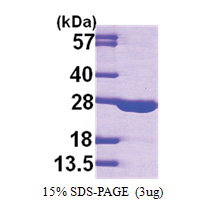Adenylate kinase 1 / AK1 (1-194, His-tag) Human Protein
CAT#: AR09708PU-L
Adenylate kinase 1 / AK1 (1-194, His-tag) human recombinant protein, 0.5 mg
Other products for "AK1"
Specifications
| Product Data | |
| Species | Human |
| Expression Host | E. coli |
| Expression cDNA Clone or AA Sequence |
MGSSHHHHHH SSGLVPRGSH MEEKLKKTKI IFVVGGPGSG KGTQCEKIVQ KYGYTHLSTG DLLRSEVSSG SARGKKLSEI MEKGQLVPLE TVLDMLRDAM VAKVNTSKGF LIDGYPREVQ QGEEFERRIG QPTLLLYVDA GPETMTQRLL KRGETSGRVD DNEETIKKRL ETYYKATEPV IAFYEKRGIV RKVNAEGSVD SVFSQVCTHL DALK
|
| Tag | His-tag |
| Predicted MW | 23.7 kDa |
| Concentration | lot specific |
| Purity | >95% |
| Buffer | Presentation State: Purified State: Liquid purified protein Buffer System: 20 mM Tris-HCl Buffer (pH 7.5) containing 10% Glycerol |
| Bioactivity | Specific: > 6.0 units/ml. One unit will convert 2.0 umoles of ADP to ATP + AMP per minute at pH 7.5 at 25°C. |
| Preparation | Liquid purified protein |
| Applications | Protocol: Activity Assay 1. Prepare 1.4 ml assay buffer (Assay buffer: 58 mM glycylglycine, 2.0 mM adenosine 5'-diphosphate, 2.3 mM beta-nicotinamide adenine dinucleotide phosphate, 10 mM magnesium chloride, 10 mM glucose, 2 unit hexokinase, 1 unit glucose-6-phosphate dehydrogenase, 0.003% (w/v) BSA, pH 7.5) - G-6-PDH/Hex (sigma,Cat.No. H-8629) 2. Add 50 ul of recombinant AK1 protein with various concentrations (0.5ug, 1ug) and read the increase in A340nm for 5 minutes. |
| Protein Description | Recombinant human AK1 protein, fused to His-tag at N-terminus, was expressed in E.coli and purified by using conventional chromatography. |
| Storage | Store undiluted at 2-8°C for up to two weeks or (in aliquots) at -20°C or -70°C for longer. Avoid repeated freezing and thawing. |
| Stability | Shelf life: one year from despatch. |
| Reference Data | |
| RefSeq | NP_000467 |
| Locus ID | 203 |
| UniProt ID | P00568, Q6FGX9 |
| Cytogenetics | 9q34.11 |
| Synonyms | HTL-S-58j |
| Summary | 'This gene encodes an adenylate kinase enzyme involved in energy metabolism and homeostasis of cellular adenine nucleotide ratios in different intracellular compartments. This gene is highly expressed in skeletal muscle, brain and erythrocytes. Certain mutations in this gene resulting in a functionally inadequate enzyme are associated with a rare genetic disorder causing nonspherocytic hemolytic anemia. Alternative splicing of this gene results in multiple transcript variants encoding different isoforms. [provided by RefSeq, Dec 2015]' |
| Protein Families | Druggable Genome |
| Protein Pathways | Metabolic pathways, Purine metabolism |
Documents
| FAQs |
Resources
Recombinant Protein Resources |
{0} Product Review(s)
0 Product Review(s)
Submit review
Be the first one to submit a review
Product Citations
*Delivery time may vary from web posted schedule. Occasional delays may occur due to unforeseen
complexities in the preparation of your product. International customers may expect an additional 1-2 weeks
in shipping.






























































































































































































































































 Germany
Germany
 Japan
Japan
 United Kingdom
United Kingdom
 China
China
